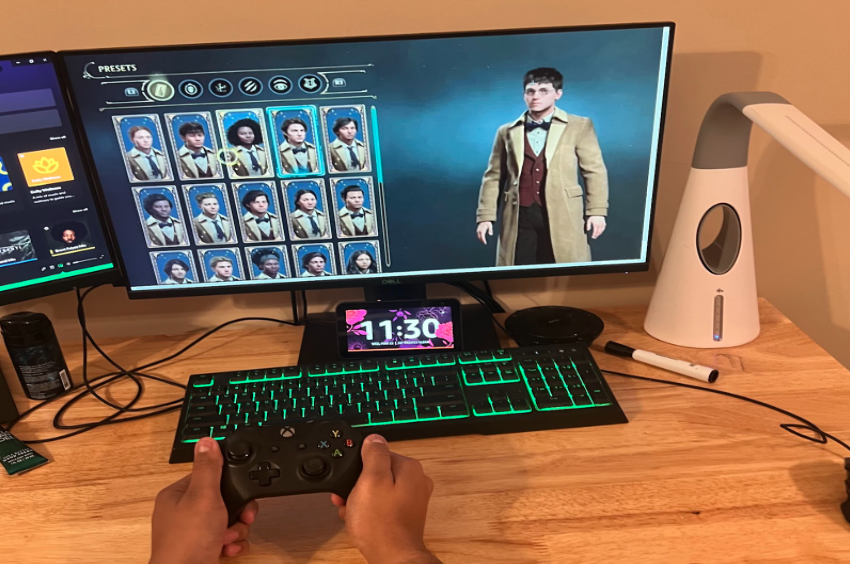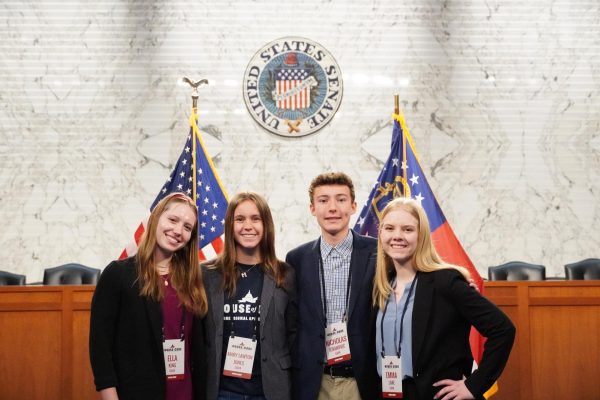“Hogwarts Legacy” Video Game Controversy: J.K. Rowling’s Transphobic Past
The controversy surrounding “Hogwarts Legacy” is accredited to the series of transphobic comments made by “Harry Potter” author J.K. Rowling in past years. The debate of whether fans can support “Hogwarts Legacy” and the “Harry Potter” franchise while also condemning Rowling’s comments on transgender people first sparked when the game was announced in 2020. With the renewal of its release in February 2023, Chamblee students have varying opinions on whether the game is even worth playing due to moral implications.
Sophomore Skyler Schwartz questions the need for this specific game.
“Why can you not just skip out on one game? It is one in a sea of hundreds– there are hundreds of games about being a wizard. If trans and Jewish people are asking for people not to play the game, then you should try not to play,” said Schwartz (’25).
However, several other students normalize separating the art from the artist.
“No matter if you support trans people or not, it is just a game. Just play the game. It does not matter,” said Aiden Lee (‘24).
Brady Devlin (‘25) thinks Rowling’s financial status should be taken into consideration.
“The fact that you are buying the game is not going to change the way she thinks and acts, so I do not think that you buying the game is supporting her as a person,” said Devlin.
Schwartz, however, argues that support is not only limited to financial means.
“I don’t think playing the game is supporting her on a financial level because a small [amount] is going to her, so monetary value is far away. But, I feel like if you know about her past, then it is still like morally supporting her a little bit,” said Schwartz.
As for opinions on J.K. Rowling specifically, many students have a general dislike for her and her actions.
“I think there is a point where people get so rich that they just say whatever they want because they can get away with it […] I don’t support her at all. I probably have a disdain for her,” said Ethan Cochran (‘26).
Devlin agrees, but his love for the franchise surpasses his feelings toward Rowling.
“I think J.K. Rowling has said some things that are not justifiable in our current society. However, I do love the “Harry Potter” books, so I like to separate the books from the person who wrote them, and I would recommend that others do the same,” said Devlin.
If students do end up playing the new game because of their love for the series, some try to support the groups that Rowling has verbally attacked.
“When I give money to J.K. Rowling, I then also give money to LGBTQ organizations, and donate to charities. I feel that it kind of balances it out, which makes me feel better about it,” said Emma Huitt (‘25).
However, there are students who do not care about the impact of playing the game.
“Yeah, playing the game is supporting her, I mean, what am I going to do about it? Like what? I am still going to play the game,” said Ryan Joshi (‘25).
Whether or not students decide to play the game, it is important for everyone to acknowledge the feelings of those who were negatively singled out by Rowling in her writing.
“People even draw back to Jewish stereotypes in the original books,” said Schwartz. “If Jewish people are hurt if you play this game, then you should reflect on that.”
Your donation will support the student journalists of Chamblee High School Blue & Gold. Your contribution will allow us to print editions of our work and cover our annual website hosting costs. Currently, we are working to fund a Halloween satire edition.

Simran Kukreja (‘24) is a junior and Staff Writer for the Chamblee Blue & Gold. In five years, she hopes to be happy with where her life is heading. Her three favorite things are her Mathnasium students, iced match green tea lattes with two pumps of chai and vanilla sweet cold foam, and Spotify.











Anon • Aug 30, 2024 at 8:59 pm
Just play the games you like – its not that complex